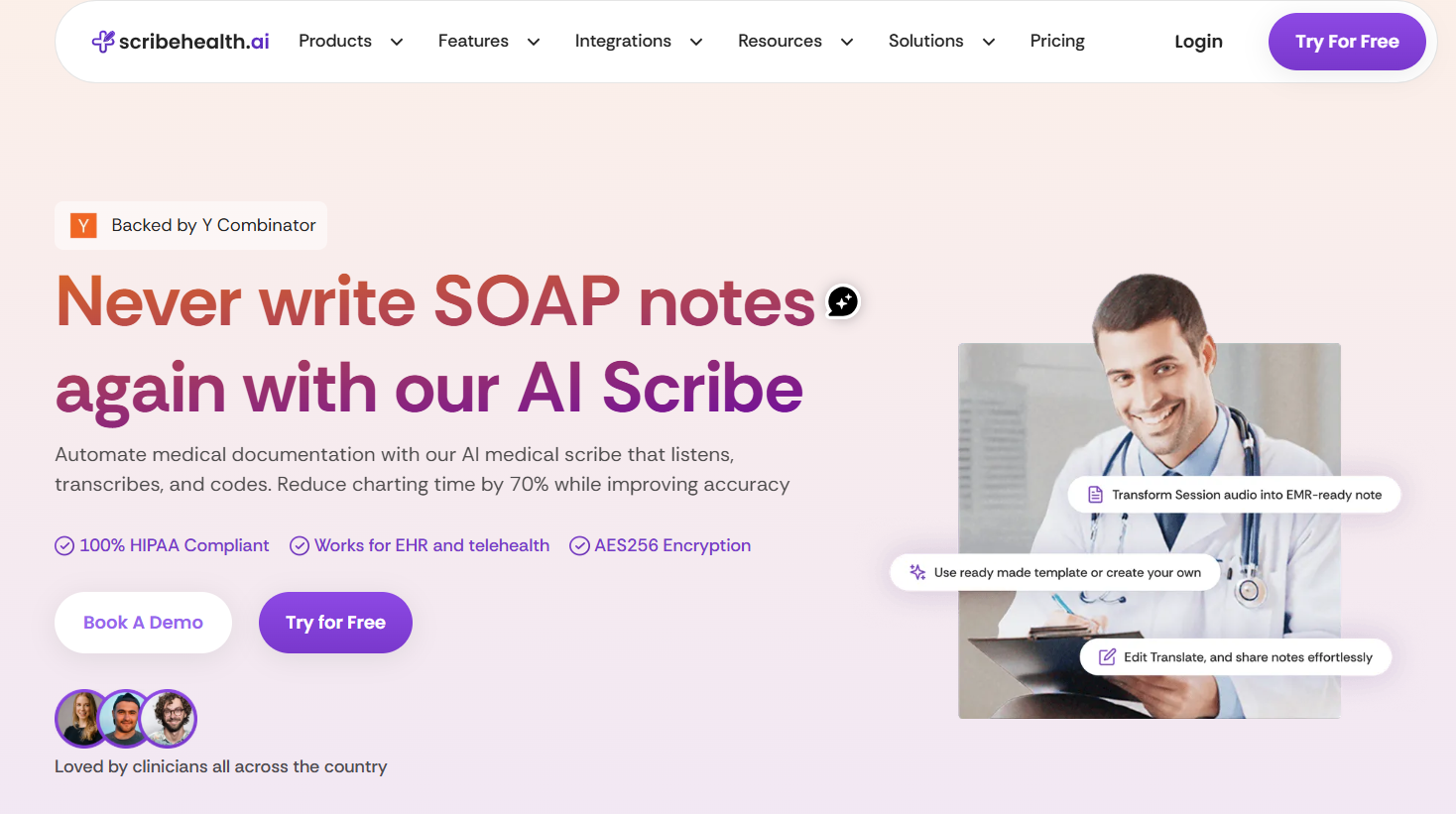Suki Pricing: Features, Cost, and the Best Alternatives in 2025
This guide breaks down Suki AI’s pricing, features, and 2025 plans, comparing it with affordable alternatives like HealOS (formerly ScribeHealth). Learn what Suki costs, how it works, and why budget-friendly AI scribes now deliver similar accuracy and automation at a fraction of the price.
.jpg)
Thinking about using Suki AI this year? You’re not alone. Thousands of clinicians are searching for real answers about Suki pricing, how much it actually costs, and whether it’s worth the investment. Suki is powerful, but it isn’t cheap. The right choice depends on your clinic's size, budget, and how deeply you want AI integrated into your workflow.
This guide breaks down Suki's cost, features, and pricing plans, plus how it stacks up against affordable Suki alternatives like HealOS (formerly ScribeHealth). You’ll see what each plan offers, who it's best suited for in 2025.
Suki: Ambient Clinical Intelligence

Suki AI is a California-based AI healthcare assistant founded in 2017. It started with a mission to help clinicians spend less time typing and more time caring for patients. Backed by $70 million in Series D funding (October 2024). Suki now supports more than 400 healthcare systems across the U.S. with its powerful AI documentation and workflow automation platform.
In 2025, Suki continues to rank among the top AI medical scribes for enterprise healthcare systems. It delivers advanced voice automation, EHR integration, and real-time documentation tools. It helps large organizations cut paperwork hours and improve billing accuracy.
Key Features
Suki goes beyond a typical AI medical scribe. It acts as a true digital assistant that automates the entire clinical workflow.
- Ambient documentation: Listens to patient conversations and builds structured notes automatically in real time.
- Voice commands and dictation: Natural voice interface — no memorized commands required.
- ICD-10 and HCC coding: Built-in billing and coding assistance for accuracy and compliance.
- Clinical Q&A: Chart-aware AI that answers patient-specific questions instantly.
- Order staging: Creates prescriptions and orders directly from patient discussions for physician review.
- Patient summaries: Generates concise, actionable summaries before each visit.
- Multilingual support: Handles documentation in more than 80 languages.
- EHR integration: Works with major platforms like Epic, Cerner, Athena, MEDITECH, and eClinicalWorks through deep API connections.
- Cross-platform access: Use on iOS, Android, desktop, or web.
Ideal Customer Profile
Suki AI is designed for large healthcare systems, specialty networks, and multi-provider clinics that need deep EHR integration and advanced workflow automation. It’s best suited for:
- Hospitals and enterprise health networks with 100+ clinicians
- Multi-specialty practices handling complex patient data
- IT-supported organizations needing bidirectional EHR data exchange
- Clinics focused on reducing physician burnout and improving efficiency
- Teams prioritizing ROI, not just upfront cost
Less ideal for: Solo practitioners or small clinics looking for transparent pricing and instant setup without IT involvement.
Suki AI Medical Scribe Pricing in 2025
Suki doesn’t list its prices publicly, but verified industry sources and customer reports provide a clear overview of its current pricing structure.
How Much Does Suki Cost?
According to Trust Radius
Suki Compose — $299/month per user
- Core AI scribe and dictation functionality
- Standard features for automated SOAP note generation
- Basic EHR integration
- Ideal for small to mid-sized clinics needing AI-driven charting
Suki Assistant — $399/month per user
- Includes all Compose features plus
- Full ambient documentation capabilities
- Workflow automation and voice commands
- Deep EHR integration and order staging
- Designed for enterprise practices and multi-specialty health systems
Enterprise Plan — Custom Quote
- Built for hospital systems and large medical networks
- Includes custom integrations, governance controls, and human QA for top accuracy
- Dedicated onboarding, SSO, and API access
- 24/7/365 enterprise support
Free Trial
- Available for testing.
- No setup fees; implementation and onboarding are included.
What Affects Suki’s Cost?
- Number of users: Larger teams benefit from volume discounts.
- EHR integration level: A Deep bidirectional setup may increase the monthly cost.
- Practice size and volume: Scales with provider count and documentation load.
- Support tier: Enterprise plans include premium 24/7 assistance.
- Implementation time: Ranges from minutes (athenaOne) to several weeks (Epic).
- Contract term: Multi-year agreements can lower per-user cost.
- Resource type: Discounts offered for FQHCs and community health centers.
Is Suki Worth the Price?
Suki’s cost depends on your organization’s size and workflow needs.
It’s worth it if you’re:
- A mid-to-large practice with complex EHR requirements
- Focused on ROI through reduced documentation time and coding accuracy
- Able to manage IT onboarding and data integration
- Seeking enterprise-grade compliance and automation
It’s not worth it if you’re:
- A small or solo practice with limited budgets
- Looking for transparent, instant pricing
- Focused mainly on affordability and fast setup
If you want a simpler, low-cost option with immediate access, HealOS (formerly ScribeHealth) is a practical alternative offering similar documentation accuracy for a fraction of the cost.
Pros and Cons of Suki
Pros
- Advanced ambient documentation and dictation accuracy
- Handles coding, Q&A, and order management seamlessly
- Two-way EHR integration across major platforms
- Proven 72% time savings on documentation
- HIPAA and SOC 2 Type II certified for enterprise security
- 24/7/365 live support
- Scalable across 100 to 100,000 clinicians
Cons
- High monthly cost ($299–$399 per user)
- Complex onboarding process for EHR integration
- No public pricing — sales call required
- Overkill for small clinics
- Some users report formatting issues in generated notes
- Requires IT involvement for setup
HealOS (formerly ScribeHealth) AI Medical Scribe

HealOS (formerly ScribeHealth) AI medical scribe that is a Y Combinator-backed healthcare automation company. It is transforming how clinicians document and manage patient encounters.
The platform serves thousands of providers across the U.S., Canada, Australia, and New Zealand. With 35+ EHR integrations and 100+ specialty templates, HealOS helps doctors reclaim time by turning every visit into structured, coded documentation automatically.
Key Features
HealOS combines advanced AI accuracy, automation, and security in one simple interface.
- Real-time SOAP notes generate chart-ready notes as you speak
- Automated coding ICD-10, CPT, and HCPCS suggestions built in
- Ambient voice capture listens quietly and documents continuously
- Specialty templates pre-built for 100+ medical fields
- Session analytics track documentation speed and efficiency
- Speaker recognition separates clinician and patient speech
- Context-aware processing understands symptoms and plans automatically
- Pre-/Post-visit tasks automate prep and follow-up workflows
Pricing
HealOS offers the most transparent pricing in the AI medical scribe market.
Free Plan — $0/month
- 20 free sessions monthly
- No credit card required
- Full feature access for testing
Standard Plan — $49/month per clinician
- Unlimited sessions
- Full EHR integration and AI coding
- No contracts or setup fees
- Free onboarding and 24/7 support
Enterprise Plan — Custom Quote
- API access, SSO, and white-glove onboarding
- Tailored for hospitals and multi-site networks
Ideal Customer Profile
It is perfect for:
- Solo practitioners and small clinics (1–10 providers)
- Budget-conscious teams needing affordable automation
- Primary care, family medicine, mental health, and internal medicine
- Telehealth clinics requiring real-time documentation
- Practices using common EHRs (Epic, Cerner, Athena, Kareo)
It is less ideal for:
- Large enterprises with custom Epic/Cerner requirements
- Multi-site systems needing native integration
- Organizations wanting heavy backend customization
Suki vs HealOS (formerly ScribeHealth): Quick Comparison 2025
Suki vs Other AI Scribe Pricing: How Much Does a Scribe Cost in 2025?
Here’s how Suki compares to leading AI scribe platforms in 2025.
1. Freed AI
Pricing: $84–$99/month
Free Trial: 7 days
Freed AI medical scribe converts clinical conversations into SOAP notes instantly and pushes them to browser-based EHRs. It’s lightweight, accurate, and simple to deploy. However, it lacks the deep EHR connectivity offered by premium systems.
Best for: Clinics with fewer than 50 providers that want a quick transcription setup.
2. Heidi Health
Pricing: $90–$99/month
Free Trial: Limited free plan
Heidi Health AI medical scribe focuses on UK and Australian clinics, offering real-time documentation and community-built templates. It’s HIPAA and GDPR compliant, supports 23 languages, and integrates with regional EHR systems.
Best for: International practices needing multilingual and local-compliance support.
3. Abridge
Pricing: $208+/month
Free Trial: Demo only
Abridge AI medical scribe creates structured summaries from patient conversations and integrates directly into Epic. It’s used by major health systems like Kaiser Permanente. The platform’s AI models excel in clarity and readability but come at a premium price.
Best for: Large healthcare systems already using Epic EHR.
4. Nuance DAX
Pricing: $830+/month
Free Trial: None
Owned by Microsoft, Nuance DAX provides enterprise-level medical documentation with human-verified transcription. It integrates deeply with Epic and Meditech and supports large organizations requiring extreme accuracy and compliance.
Best for: Hospitals and enterprise systems with full IT infrastructure.
Explore the Best AI Medical Scribe in 2025.
Final Verdict
If you’re a large hospital system with hundreds of providers and an established IT department, Suki AI medical scribe can deliver real ROI through automation and workflow depth, even at $399 per month.
But if you’re a smaller practice looking for fast setup, transparent pricing, and real-time accuracy, HealOS (formerly ScribeHealth) wins hands down. It delivers 90% of Suki’s features at less than one-eighth of the price, making it the best Suki alternative in 2025 for value, performance, and simplicity.
Ready to save hours on charting and cut your documentation costs? Start your free trial with HealOS (formerly ScribeHealth) today.
FAQs
How much does Suki AI cost in 2025?
Suki costs start at $299/month for Suki Compose and $399/month for Suki Assistant. Enterprise plans are available by custom quote, depending on EHR integration depth and organization size.
Is Suki AI worth the cost?
Suki is valuable for large healthcare systems needing full EHR integration, voice commands, and enterprise security. However, smaller practices often find HealOS (formerly ScribeHealth) a better value at $49/month with similar real-time documentation accuracy.
What are the best Suki AI alternatives in 2025?
Top alternatives include HealOS (formerly ScribeHealth), Freed AI, Heidi Health, DeepScribe, and Abridge. These options vary by price, features, and EHR connectivity.
.png)
